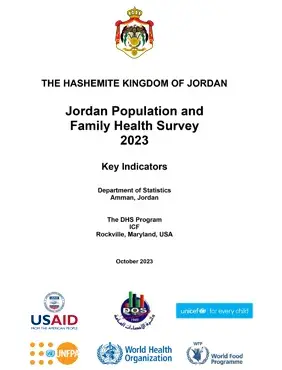The 2023 Jordan Population and Family Health Survey (JPFHS) is the eighth Population and Family Health Survey conducted in Jordan, following those conducted in 1990, 1997, 2002, 2007, 2009, 2012, and 2017–18. It was implemented by the Department of Statistics (DoS) at the request of the Ministry of Health (MoH). Data collection took place from January 2023 to June 2023. The survey protocol, including biomarker collection, was reviewed and approved by the ICF Institutional Review Board.
Financial support for the 2023 JPFHS was provided by the government of Jordan, the United States Agency for International Development (USAID), the United Nations Children’s Fund (UNICEF), the United Nations Population Fund (UNFPA), the World Health Organization (WHO), and the World Food
Programme (WFP). ICF provided technical assistance through The DHS Program, a USAID-funded project offering support and technical assistance in the implementation of population and health surveys in countries worldwide.
This Key Indicators Report presents selected findings from the 2023 JPFHS. A comprehensive analysis of the data will be presented in a final report to be published in the second quarter of 2024.
As in the previous JPFHS surveys, the primary objective of the 2023 JPFHS is to provide up-to-date estimates of key demographic and health indicators. Specifically, the 2023 JPFHS:
- Collected data at the national level that allowed calculation of key demographic indicators
- Explored the direct and indirect factors that determine levels of and trends in fertility and childhood
- mortality
- Measured contraceptive knowledge and practice
- Collected data on key aspects of family health, including immunization coverage among children,
- prevalence and treatment of diarrhea and other diseases among children under age 5, and maternity care indicators, including antenatal visits and assistance at delivery
- Obtained data on child feeding practices, including breastfeeding, and conducted anthropometric
- measurements to assess the nutritional status of children under age 5 and women age 15–49
- Conducted hemoglobin testing with eligible children age 6–59 months and women age 15–49 to gather
- information on the prevalence of anemia
- Collected data on women’s and men’s knowledge and attitudes regarding sexually transmitted infections and HIV/AIDS
- Obtained data on women’s experience of emotional, physical, and sexual violence
- Gathered data on disability among household members
The 2023 JPFHS will provide valuable information on trends in key demographic and health indicators over time. The information collected through the survey is intended to assist policymakers and program managers in evaluating and designing programs and strategies for improving the health of the country’s population. The 2023 JPFHS also provides indicators relevant to the Sustainable Development Goals (SDGs) for Jordan.


